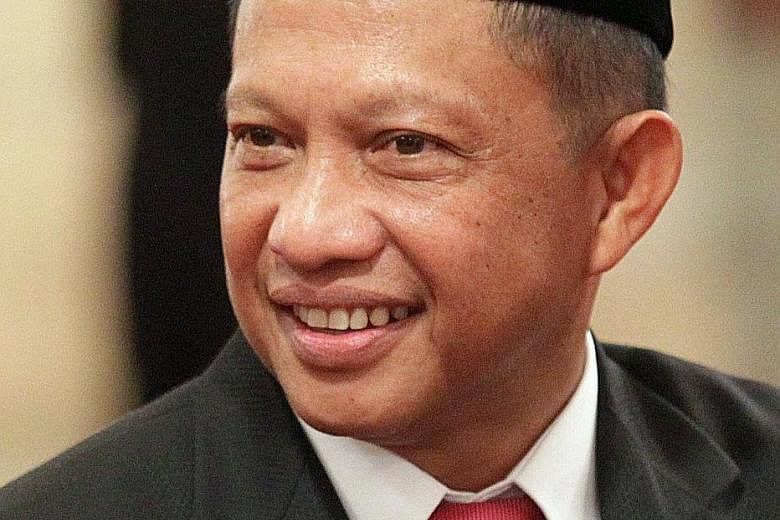Indonesia's new counter-terrorism boss Tito Karnavian is a warrior-philosopher who is not only good with a gun, but also able to look beyond the barrel of one to prevent a terror attack from taking place.
The general, sworn in last Wednesday as head of the Badan Nasional Penanggulangan Terorisme (BNPT), or national counter-terrorism agency, is known for dismantling the Jemaah Islamiah (JI) terrorist network, which had wreaked havoc across South-east Asia for almost a decade.
But the 51-year-old, earmarked to one day lead the national police force, also has a doctorate in terrorism and Islamic radicalisation.
A year ago, he flagged the threat from Indonesians who have joined the Islamic State in Iraq and Syria (ISIS), saying they would pose a danger to the region upon their return.
He called for greater police powers to go after suspects with links to ISIS. "Our legislation today is not sufficient to cover and to prevent and to investigate those supporting ISIS," he said in March last year.
His fears were well founded.
In January this year, a domestic terror cell of militants loyal to ISIS struck central Jakarta.
The Jan 14 incident, which was the first major act of terror in the country since the 2009 bombings of the JW Marriot and Ritz-Carlton hotels, gave the current administration an impetus to ramp up its war on terror and it needed a new leader to counter the threat of ISIS.
As commander of the Detachment 88 (Densus 88) counter-terrorism unit, Inspector-General Tito had led the operations that took out Azahari Husin and Noordin Mohammad Top, two JI militants behind the 2002 Bali bombings.
He also oversaw the Densus 88 raid on a JI training camp in Aceh, which led to the arrest of the group's spiritual leader, Abu Bakar Bashir, and radical ideologue, Aman Abdurrahman, in 2010.
The capture of the two clerics eventually led to the breakdown of the JI network in Indonesia.
Ambassador Barry Desker, once Singapore's envoy to Indonesia, said Gen Tito was the "critical factor" in the development of an effective Densus 88. "He has a strong background in the nature of the current terrorism threat, an awareness of the historical antecedents of Indonesian terrorist movements, and has spent considerable time developing appropriate counter-terrorism responses," Mr Desker added.
Gen Tito, who was born in Palembang, South Sumatra, is married with a daughter and two sons.
He graduated top of his class at the Police Academy in 1987 and went on to complete a master's degree in police studies from the University of Exeter, as well as a second degree in strategic studies from Massey University in New Zealand.
In 2013, he received his PhD from Singapore's S. Rajaratnam School of International Studies. The highly educated police officer, however, is no armchair general.
Besides investigating several terror attacks, he was also involved in prominent cases such as the 2001 arrest of former president Suharto's son, Tommy, over the murder of a judge, as well as the beheading of three Christian girls in Poso, Central Sulawesi, in 2005.
After his stint as Densus 88 commander ended in 2010, Gen Tito was appointed second-in-command at BNPT, where he remained until he was promoted to police chief in Papua province in 2012.
He is now riding high after being widely commended for his handling of the attack in Jakarta while he was the capital's police chief, a role he was promoted to last year.
Observers say that may explain why his promotion to the three-star-general post went by without any opposition, which is rare in Indonesia where prominent appointments can be drawn out.
Even the high-level oversight committee Kompolnas, which is traditionally critical of the police, applauded the move.
"Tito is an officer who has mastered the issue of terrorism," said Kompolnas commissioner Edi Hasibuan. "This can be seen in the way he handled the terrorist attack in Jakarta."
The long queue to congratulate him after his inauguration was evidence of how highly regarded the man is by both his peers and superiors. Gen Tito, though, has a difficult task ahead - one that will require him to focus on winning the hearts and minds of terrorists.
This is because one of his top priorities at BNPT is to roll out an effective rehabilitation and deradicalisation programme for extremists - something his predecessor was said to have failed to do.
Those who have worked with Gen Tito say he is the best man to develop and implement such a plan because he is a thinking man's warrior - a rarity among the elite in Indonesia's police establishment.
Counter-terrorism and security expert Susan Sim said the general has always advocated the importance of a strong counter-narrative to the call of Islamic radicalism.
"Gen Tito not only has very detailed knowledge of the terrorist landscape in Indonesia and first-hand operational experience fighting the militants," said the vice-president from The Soufan Group. "But he also understands how important it is for the government to work together with the community to counter extremism."
Gen Tito has plans to set up a special prison for convicted terrorists to curb their influence and prevent them from spreading their radical ideology to other prisoners and planning attacks from behind bars.
He also wants to engage prominent militants to persuade them to abandon their extremist beliefs, but these plans are just part of his multipronged strategy to tackle the terror threat.
The general has also made it clear that Operation Tinombala in Poso, the kill-or-capture mission for Indonesia's most wanted terrorist, Santoso, is still on and he plans to get his man.
"I am quite optimistic and I don't mean to be arrogant," said Gen Tito after his swearing-in at the Presidential Palace last Wednesday.
"I have been dealing with terrorism since 1999 and I have been involved in a variety of operations, including (counter-terrorism operations) in Poso, which I had led for 11/2 years... so my appointment today is like me returning home."

